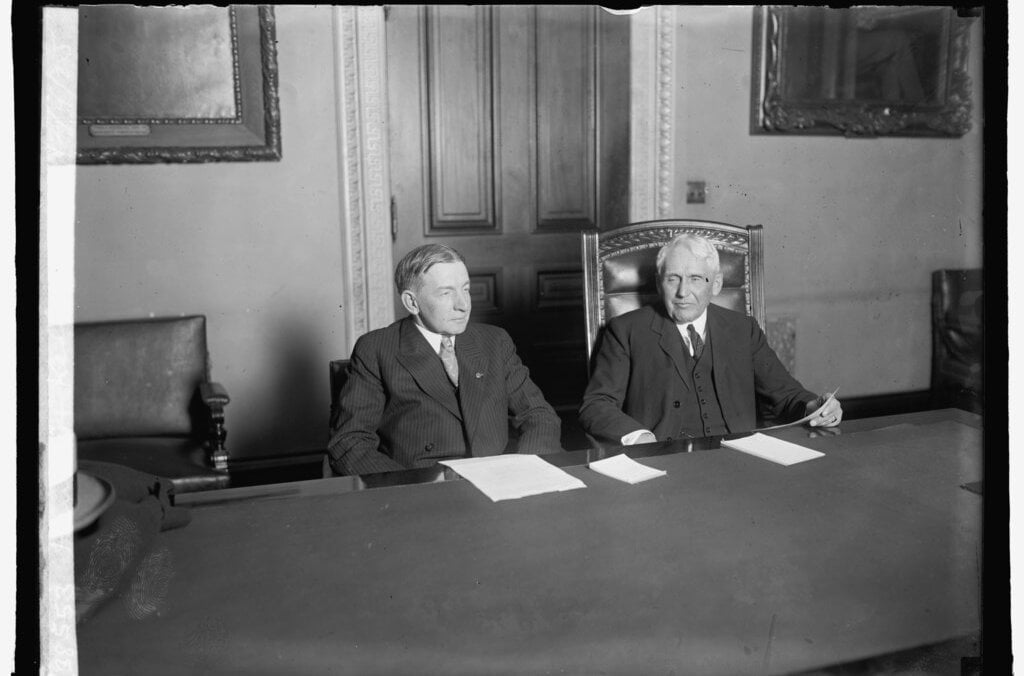Frank B. Kellogg
Speed read
Frank B. Kellogg was awarded the Nobel Peace Prize for his crucial role in bringing about the Briand-Kellogg Pact.

Full name: Frank Billings Kellogg
Born: 22 December 1856, Potsdam, NY, USA
Died: 21 December 1937, St. Paul, MN, USA
Date awarded: 10 December 1930
The Briand-Kellogg pact
Secretary of State Frank Kellogg was awarded the Nobel Peace Prize for a 1928 multilateral treaty renouncing war as an instrument of national policy. This idea originated with Nobel Peace Prize Laureate Aristide Briand (France), who first proposed a bilateral Franco-American treaty that would protect France against a German revanchist war following that country’s WWI defeat. Not wishing to bind the USA to France so specifically, Kellogg proposed a broader pact instead. He also insisted upon an exemption clause allowing the USA to intervene in Latin American countries that acted against US interests. Although most nations of the world signed the Briand-Kellogg Pact, it achieved no lasting influence.
”(…) We also realize that the collaboration of all nations, of which the Kellogg Pact is the great outcome, must be extended to fields other than the purely political.”
Johan Ludwig Mowinckel, Member of the Nobel Committee, Presentation speech, 10 December 1930.

A pact with limitations
When the Briand-Kellogg Pact was being drafted in 1928, the USA and Great Britain insisted that exemptions be made for the American continent and the British Empire. They were not willing to accept other nations interfering in the policies they conducted toward these regions. In August 1928 the pact was signed in Paris by Briand, Kellogg and representatives of 13 other countries. During the following year, all the sovereign nations of the world signed the pact, except for Argentina and Brazil, which were highly critical of US intervention in Latin America.
”Certain it is that a great responsibility rests upon the statesmen of all nations, not only to fulfill the promises for reduction in armaments, but to maintain the confidence of the people of the world in the hope of an enduring peace.”
Frank Kellogg, Speech, 10 December 1930.
The Norwegian Nobel Committee and Kellogg
There was disagreement within the Norwegian Nobel Committee regarding the award to Frank Kellogg. The Norwegian adviser who investigated him was highly critical; he pointed out that the 1928 Briand-Kellogg Pact had served no practical purpose and wrote disparagingly of the most recent US invasions in Latin America. One member of the Nobel Committee, while in the USA, wrote home that Kellogg was not deserving of the prize. But the Norwegian prime minister, also a committee member, supported his nomination, most likely in the hope that a peace prize to Kellogg would sway the US into joining the League of Nations.
”The 1929 prize awarded to Frank B. Kellogg … seemed well deserved at the time but has not stood up in the light of later events and the investigations of historians.”
Irwin Abrams, The Nobel Peace Prize and the Laureates, page 117, Science History Publications/USA 2001.
Learn more
The life of Frank Billings Kellogg, a farm boy who rose to international preeminence as the co-author of a treaty to outlaw war, is a uniquely American story ...
Disclaimer: Every effort has been made by the publisher to credit organisations and individuals with regard to the supply of photographs. Please notify the publishers regarding corrections.
Nobel Prizes and laureates
Six prizes were awarded for achievements that have conferred the greatest benefit to humankind. The 12 laureates' work and discoveries range from proteins' structures and machine learning to fighting for a world free of nuclear weapons.
See them all presented here.
